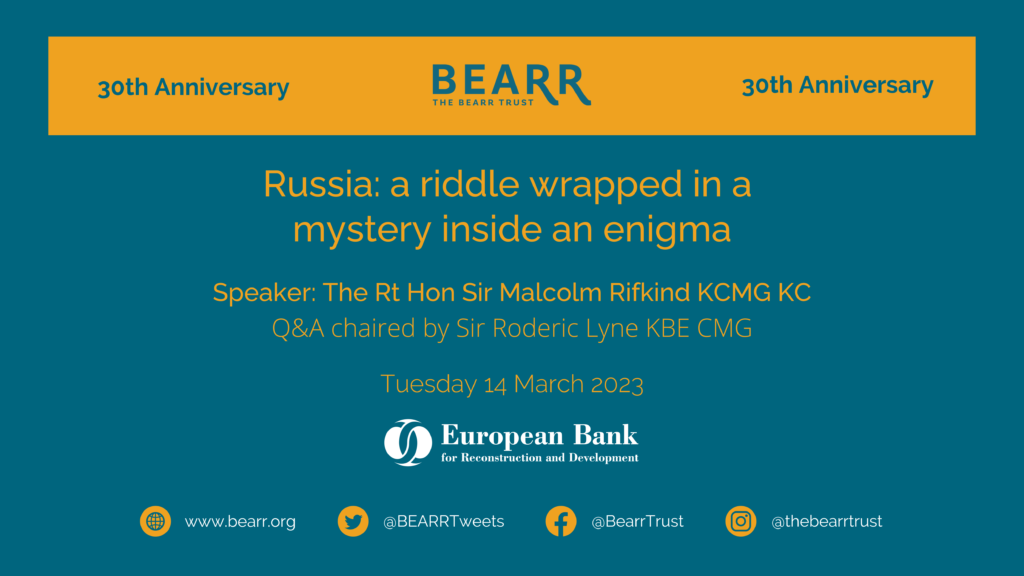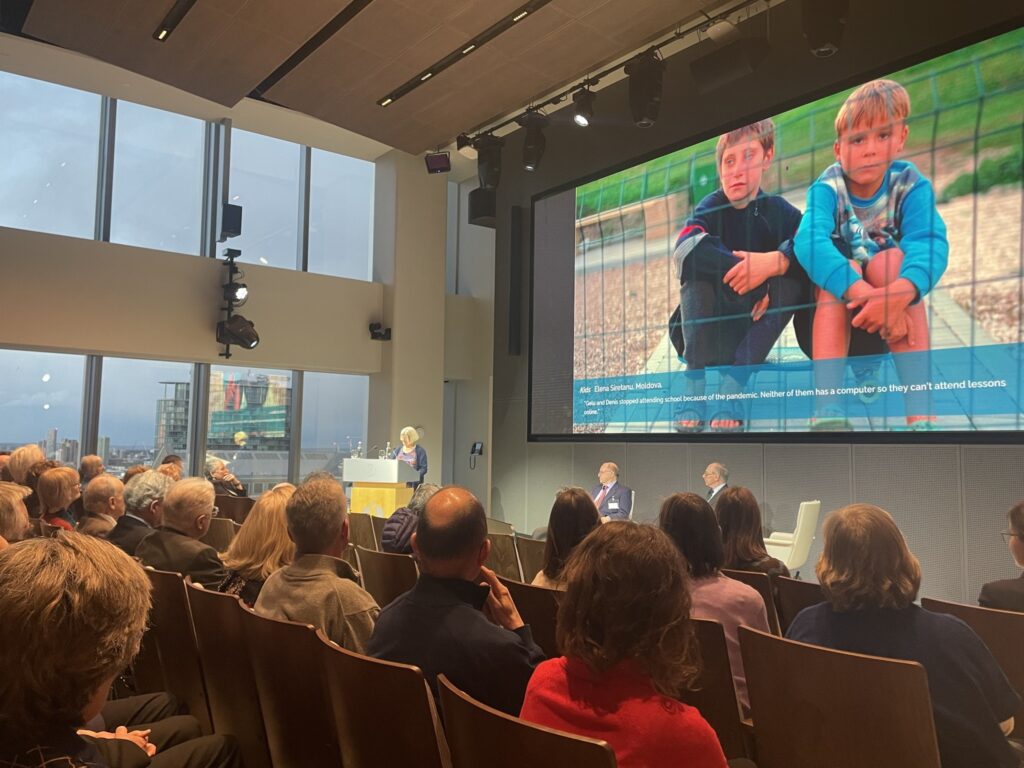Report: The BEARR Trust’s 30th Anniversary Lecture
Russia: a riddle wrapped in a mystery inside an enigma
Ross Gill, BEARR Trustee
March 2023
The BEARR Trust’s thirtieth anniversary year saw Russia’s invasion of Ukraine, the return of war to Europe and a humanitarian crisis. BEARR has once again supported emergency assistance, as we did in the early 1990s – this time through a network of civil society organisations in Ukraine and Moldova which are providing relief and rebuilding in the face of Putin’s aggression.
Sir Malcolm Rifkind was the UK’s Defence Secretary and Foreign Secretary during BEARR’s early years in the 1990s. In March, he gave our anniversary lecture, with questions chaired by Sir Roderic Lyne, the former British Ambassador to Moscow. The lecture was held at the European Bank for Reconstruction and Development’s new headquarters at Canary Wharf: like BEARR, the EBRD was also established in the early 1990s, and we have been grateful for the Bank’s support over many years. You can find a full recording of the talk on our YouTube channel here.

Churchill’s description of Russia as “a riddle wrapped in a mystery inside an enigma” is a well-known phrase. But the rest of the saying is less well known. “But perhaps there is a key,” Churchill continued. “That key is Russian national interest”. Russia’s invasion of Ukraine (and its earlier aggression) appears irrational and self-harming. But Sir Malcolm argued that the Russian regime’s perceptions of national interest explain its motivations, and it is important to understand these.
For Sir Malcolm, the annus mirabilis of 1989 brought together three transformational changes. First, the revolutions of 1989-91 brought about the end of the Cold War and a significant reduction in the likelihood of nuclear conflict. Second, it led to the end of communism as a credible and mobilising alternative to Western liberal capitalism. The communist alternative had given the Soviet Union substantial influence beyond its military or economic muscle – but this ideological influencing power is no longer available, even to China as a nominally ‘communist’ state. Third, it marked the end of Europe’s last great land empire.
It is this last transformational change that Sir Malcolm regarded as key in understanding Russia’s perception of ‘interests’. The Soviet Union long outlasted the other European land empires, as well as the overseas empires of Western Europe. When the collapse came, it resulted principally from internal forces, including Yeltsin’s challenge from Russia to the authority of the Soviet centre – and many in the West took a cautious view at the time. Yet the land empire contracted, rather than disappeared: Russia remains vast, and the Russian government continued to perceive threats from outside, and to maintain a hostile and interventionist stance towards its neighbours over many years (a central point made by Edward Lucas in his lecture for BEARR in November 2022).
Could an alternative have been followed? Sir Malcolm argued that it could: cultural links across the Soviet Union were strong at the point of collapse, and that there was no reason why good relations between Russia and its neighbours could not have prevailed, had the Russian government taken a different stance. More broadly, Sir Malcolm was present at Mikhail Gorbachev’s first meeting with Margaret Thatcher in 1984, and witnessed at first hand how adversaries could build up a relationship of trust, and how more open attitudes could lead to change.
Despite the failure of Russia’s relations with the West (and its neighbours), its interests may yet lead it to re-think its global stance. Other than in its (very significant) possession of nuclear weapons, it is not a superpower in a meaningful sense: its non-military technology base is weak, its economy relatively small and its population contracting. During its war against Ukraine, its international support has also been weak: very few countries have voted with Russia at the United Nations. While China’s (lukewarm) support may be welcome to Russia for now, in the long run it presents a significant potential threat. Meanwhile, the war has solidified support within Ukraine for closer relations with Europe and the West – precisely the outcome that Russia sought to prevent.
Potential outcomes of the war
Essentially, there are three ways in which wars come to an end: total victory to one side (which is unlikely in this case); a workable compromise (which is possible, but unlikely in the short-to-medium term); or a ‘frozen conflict’, of which there are several examples, many of which (such as in Korea) have persisted for decades). At this stage, predicting the outcome is impossible, and both sides want to start negotiations (if and when they start) from a position of strength. In the meantime, Sir Malcolm saw the West’s response as the right one: strong support for Ukraine, including from the UK, but cautious in the wider context of the consequences of escalation.
Regime change in Russia is also a possibility, although Sir Malcolm saw this as unlikely, at least in the near term, especially given the absence of any straightforward mechanism for removing Putin. But any alternative leader would be better: they would, at least, not have initiated the war, and would have a greater ability to exit.


